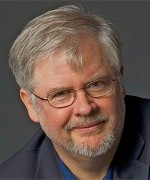Column Name
Title
Christopher Durang has run the Juilliard playwrights program since its inception, in 1994, with Marsha Norman. A New Jersey native, he attended Harvard College and the Yale School of Drama, where he studied English and playwriting, respectively. He has also taught at Yale and Princeton, but most of his energy goes toward his award-winning playwriting career. This month, the PEN American Center will name him the Laura Pels International Foundation for Theater Awards master dramatist (one of his former Juilliard students, Adam Rapp, will be one of two winners of the Pels Foundation’s midcareer awards). Also this month, Durang’s latest play arrives at Lincoln Center Theater. Called Vanya and Sonia and Masha and Spike, it’s a comic mash-up inspired by Chekov’s Uncle Vanya, and it begins previews on October 25. A joint production of L.C.T. and McCarter Theater (in Princeton, N.J.), it received its premiere at McCarter in September.
Body
When and how did you decide to become a playwright?
When I was 8, I announced to my mother I was going to write a play. It was my own, two-page version of an I Love Lucy episode, and my class at Our Lady of Peace School actually put on the play one afternoon instead of doing geography. It was a fairly conventional school, so why they did that I can’t imagine. I got to choose the cast and “direct.” My fellow 8-year-olds laughed at the play, and I thought, “Yes, playwriting for me!” I kept writing, and then when I was 13, I wrote a musical with my friend Kevin Farrell, and the drama department at our school, a Catholic, all-boys prep school called Delbarton, put on the full-length show. We “borrowed” girls from a nearby Catholic school, and that was my first experience of auditioning actors—these young high school girls.
Who was the teacher or mentor who most inspired you when you were growing up and what did you learn from that person?
I was fortunate with many wonderful teachers. I get so upset when people in the country bad-mouth teachers and seem angry that they want to make a living wage. Teachers who helped and inspired me included Denis Malin, who directed two of my musicals at Delbarton, and Father Sean Cuneen, who taught history and assigned us an essay every single night—I learned to write because of that ongoing assignment.
At Harvard, William Alfred—a scholar and a playwright (his Hogan’s Goat was an Off Broadway hit starring Faye Dunaway)—was the most engaging lecturer on literature. I learned to love Chekhov and Beckett because of him. And my senior year I lucked out and took a playwriting seminar with him. He was this saintly man who went to Catholic Mass every day, and yet he liked and encouraged my dark and anarchic comic plays.
At the Yale School of Drama, Howard Stein and Robert Brustein gave me their and wisdom. And the wonderful writer-cartoonist Jules Feiffer taught me for one year—I adored his work, and his encouragement was so helpful. I love teachers.
What is your favorite thing about New York City?
Hopping on a subway on an impulse and going to see a Broadway play or musical. I paid $10 for an obstructed seat (which was pretty good, actually) to see the original Chicago starring Gwen Verdon, Chita Rivera, and Jerry Orbach—and seeing those three Broadway legends was thrilling. I also saw Sondheim’s original Follies, in 1971, for $10 and it was one of the best things I’ve ever seen.
You and playwright Marsha Norman are co-chairs of the playwriting program, and you team teach. What is that like?
When Marsha asked me to join her in 1994, I had never “team taught” or been taught by more than one teacher at a time. I worried what would happen if we disagreed a lot. But when we started reading our students’ work, I found we almost always agreed—among other things, we are both fans of character and plot, which makes us slightly old-fashioned. We’re not drawn to plays that are all “language”—and we never have accepted a student we didn’t agree on. I view our work more as being mentors—our students are post-college-age and up, and they are often already fairly accomplished.
Another nice thing I find is that when a student is excited and inspired by the play he or she is writing, it often encourages me to go home and start a new play.
Finally, it is so great for our playwrights to have access to the Juilliard acting students, in bimonthly “play labs” (where our students’ current plays get read aloud in front of an audience). Plays are meant to be acted and seen, not just read around a table. And hearing the actors read the plays aloud is such a gift—we learn what doesn’t work and what works wonderfully. It’s a very important part of our program.
If your students could only remember one thing from your teaching, what would it be?
Well, it’s something one can’t quite teach, and it’s psychological, but I hope for all of them that they discover an inner sense of their own worth as writers—and that they learn how to “know” when their work is already good, and not take the advice of so many people out in the theater world who are anxious to tell them how to rewrite their plays. I mean, you must be open if your play needs to be rewritten radically—sometimes it does. But other times, your play is in good shape already and you can be led astray by trying to please directors and dramaturgs and artistic directors who tend to approach young writers in particular as if a play is never, ever done. Rewriting is necessary, but hold on to the play you want to write, and don’t get mixed up with pleasing people or assuming everyone else knows better.





